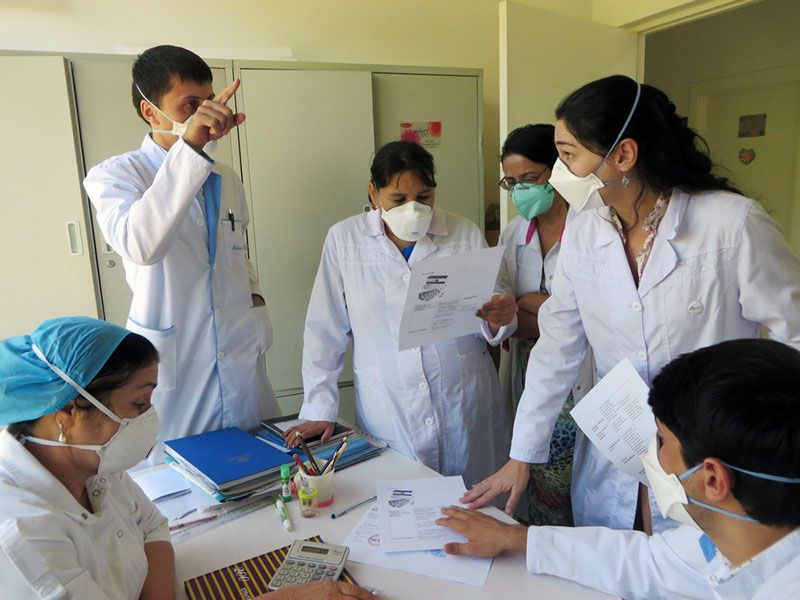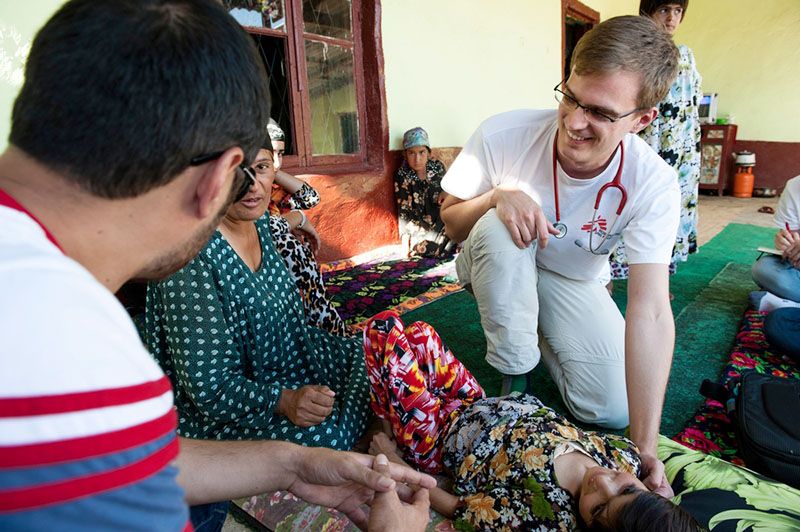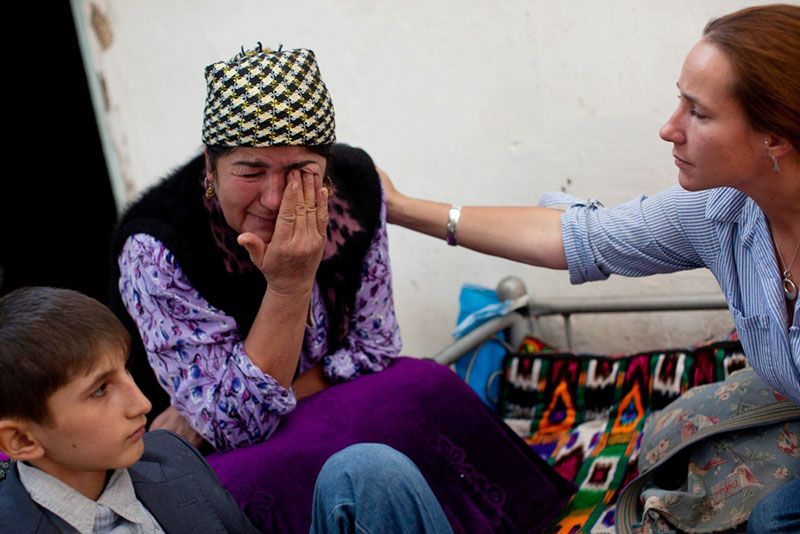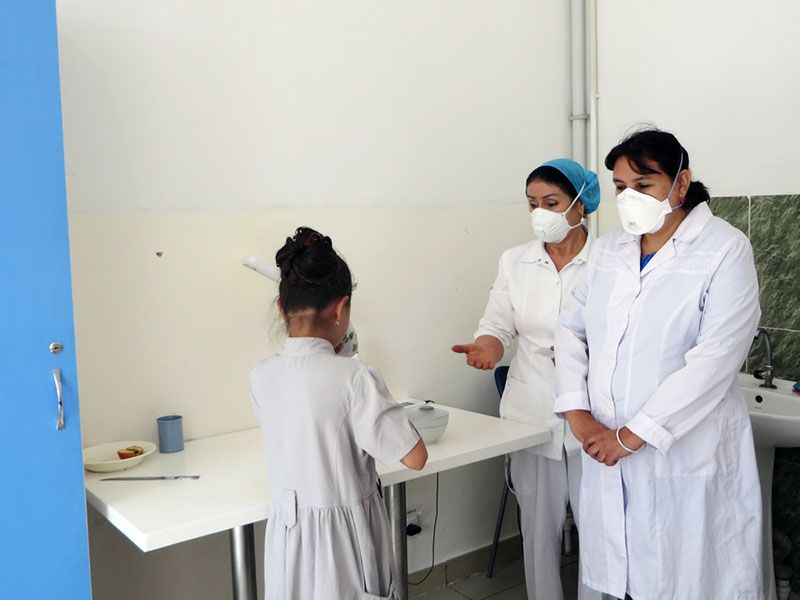Dr. Ana P. Cavalheiro, from Brazil, is MSF’s Medical Activity Manager for the TB program in Tajikistan. Here he explains the unique ways MSF helps treat both paediatric and adult patients and prevent the spread of tuberculosis through testing, treatment, and education.

"You cannot easily see the bacterium in the sputum (mucus) of children with TB. So you have to do a clinical diagnosis, which is harder to do it. Many times we don`t have proof that the child really has TB.
It is like a puzzle and then you have the clinical features, you have the index case and then you have the chest X-rays, a skin test. And then with all this information, we do the diagnosis.
After the diagnosis is made then we have to test for other illnesses. We have to see if the child has any other problem that could make it harder for them to have the treatment. For example, we do an HIV test, tests for Hepatitis, we see how the liver is, if the child has anaemia, and then with this information, we come up with the best treatment.
When we have all these things we present the results to the Ministry of Health here, which is the local authority here with local doctors, and discuss the treatment we believe should be started, and once agreed, we talk to the patient.
Many times it’s challenging to tell the parents of the patient. For example, I was talking to one of our doctors just now, about this three-year-old girl who clearly has TB.
Her sputum is negative but she has all the symptoms, the X-ray shows very classic signs of TB. And she’s just three years old.

The mother is in treatment and herself she doesn’t believe so much in her treatment, she’s not treating it well and then we talked many times with the family and other relatives, and we couldn’t make them accept that the child was really sick. And then, unfortunately, the child is without treatment.
With positive results, then it’s different. Then you have more ways to help someone accept starting the treatment. But it’s never easy. Even for others, many, they don’t accept the treatment. Who wants to force this with a child? It’s complicated.
Many times we talk with the parents, many times we had this challenge with the parents and they accept it. Now we have one of our patients who is on treatment.
She had proven abdominal tuberculosis. But the mother didn’t agree to it, the treatment, because the husband was in Russia and he is the one who makes the decisions for the family and they had difficulty communicating with the husband.
They could only communicate when he called and she couldn’t call him. So for more than a month, we talked so many times to her about how the child needs the treatment, with the mental health team, many, many times, until one day, I think it was two months later, they finally agreed and now she’s doing really well.

It’s something that you have to go through every consideration. It’s hard, it’ takes a long time and sometimes they start the treatment and then they’re only feeling better after six, or eight months of treatment.
The hope is that we can assure them that they’re receiving the best treatment. Some patients they go through years of treatment for TB and without any result.
Then we give them better medication, and in only one month of waiting, the tests are finally negative. That’s something that brings hope to them.
Finally, they’re having the best treatment. And it’s not just having the side effects without any improvement.
We have a family of four people in one of the families we’re treating. They were diagnosed with TB, I think two to three years ago, and already three people in the family from the same house have died of TB after trying treatments that didn’t work for years. At that time, they couldn’t access the new TB drugs.

They had extensively drug resistant TB (XDR TB). The last one who died, when he was alive, we tried making them accept a new treatment (after the approval of the importation of bedaquiline and delamanid into Tajikistan), which they refused. After he died, we talked again with the family and then this time they accepted.
We had so many sessions of talking, you know, to help them trust us, to start this new treatment. We were saying to them, that now it’s different, different medication.
It was hard for them to believe that and when they started treatment, they were still a little bit suspicious.
The first time that we came back they could see, you know, they were feeling better and we were giving better medication without injections, that it was something that was good for them. After less than a month, their tests results came back as negative.
After having positive test results for over two years: it was finally negative. And now it’s so good to see the difference for the family now.
The person that takes the decisions in this family is the mother and she was the hardest one to convince. Now she’s very happy and she comes and greets us and she’s so happy with the support."
MSF has worked in Tajikistan for the last 20 years, focusing on improving children’s access to treatment for tuberculosis (TB). Where possible, the programme in Tajikistan aims to treat patients at home, demonstrating that comprehensive TB care for children is feasible.
The project also treats children who have both TB and HIV, and TB and severe malnutrition.
Since November 2011, MSF has been working with the Tajik Ministry of Health (MoH) to diagnose and treat children and their families who are diagnosed with drug-sensitive and drug-resistant tuberculosis (DR-TB).
Find out more about MSF's work in Tajikistan.